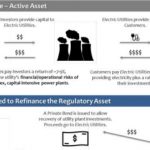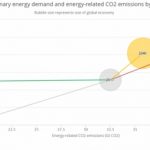At over $400bn in 2018, global fossil fuel consumption subsidies are more than double those for renewables. That makes sense while governments worldwide use energy subsidies to help poor consumers, and clean energy still makes up a smaller proportion of the global energy mix. But it makes the transition harder: cheaper fossil energy means more is consumed, and it’ll take longer for clean energy to compete it away. The IEA’s WEO Energy Analysts … [Read more...]
World Bank fossil fuel funding still exceeds renewables
The World Bank is being criticised for still lending far more money to fossil fuels projects than renewables. Energy equals development, but this goes against their commitment to supporting clean energy in the developing world. The World Bank has disputed the magnitude of the difference. Their record needs to be made clear before COP25 in Santiago, Chile this December when the World Bank and other development banks must present their plans for … [Read more...]
“Responsible” ESG investments hit $20tn, a quarter of the world’s professionally managed total
ESG (Environmental, Social and Governance) factors measure the sustainability and ethical impact of an investment. ESG includes the energy sector, and the amounts spent show it’s no longer just an ethical choice, says The Rocky Mountain Institute’s Todd Zeranski. It doesn’t just save the planet, it saves our pensions. Why? From regulatory penalties to the cost of climate clean-up, fossil fuel investments are getting too risky and expensive. Those … [Read more...]
1.5°C: IEA’s scenarios will fail, need urgent review says letter from experts, business leaders
The letter’s signatories – experts, business leaders, politicians and more - call on the IEA to make the 1.5°C target the central scenario in its highly influential annual World Energy Outlook. At present, its “New Policies Scenario” puts us on track for between 2.7°C and 3.3°C. That's a problem, because too many energy decision-makers cite it as an acceptable guide, making it a self-fulfilling prophecy. Even the “Sustainable Development … [Read more...]
We need to trace the real fossil fuel users, not just the “end consumers”
Climate-consciousness is rising among ordinary citizens. But most fossil fuels are consumed by large technological systems (electricity networks, urban transport systems, built environments, industrial and agricultural systems), not by individuals. Simon Pirani says we need to trace that consumption to its true source, and thereby put the pressure directly on them to transition. It’s not simple: even the IEA admits it loses track of who is … [Read more...]
What’s next for the geopolitics of energy transformation?
January’s IRENA report “A New World” has kick-started the debate on how the accelerating deployment of renewables will affect and alter the global distribution of political and economic power. Jan Frederik Braun and Daniel Scholten review its findings and build on the list of issues that must be faced. For example, although the IRENA report focuses on electrification the authors say power-to-gas is likely to play a major role, and we must face up … [Read more...]
“Energy Charter Treaty review should end protection for fossil fuels”
In her previous article Sarah Keay-Bright said the outdated Energy Charter Treaty protects old world fossil fuel investments over the wide range of new green investments now being made. The treaty is being reviewed by its signatories this year. In a concluding article, she and Steivan Defilla warn that the terms of reference for the ECT review don’t even mention the need to align the treaty with the Paris Agreement. They say the revised ECT must … [Read more...]
Renewable hydrogen “already cost competitive”, says new research
Jocelyn Timperley at Carbon Brief has interviewed the lead author, and the critics, of this new report titled “Economics of converting renewable power to hydrogen”. The research says renewable hydrogen is already proving competitive for niche, high-intensity users in Germany and Texas. Future technological improvements, combined with expected changes to subsidies and CCS requirements, can make it so for large-scale industrial users in the next 10 … [Read more...]
“Outdated Energy Charter Treaty leaves new economy investments unprotected”
This year the Energy Charter Treaty (ECT) is being reviewed by its signatories. It’s the most invoked international investment agreement in the world, and it needs either to be reformed or abandoned, says Sarah Keay-Bright. Created at the end of the cold war, it was designed to protect international energy investments – in a fossil fuel world - from political risk. Today, its wording and mechanisms are failing to protect investors that are vital … [Read more...]
GGFI: “Avoid carbon bubble, choose financial centre wisely”
We already have indexes that pick green stocks, and rank nations by their policies. The Global Green Finance Index (GGFI) ranks the world’s financial centres – London, New York, Singapore, Shanghai, etc. – by the policies and support they give to green investments. Old ways of valuing assets, particularly in fossil fuel companies, are being questioned say Mike Wardle and Michael Mainelli of the think tank Z/Yen, one of the creators of the index. … [Read more...]
Analysis: BP’s outlook for fossil fuels could be undermined by slowing energy demand
BP’s latest projections, released last week, once again concede that their previous reports have been overestimating fossil fuel consumption and underestimating renewables. Yet BP still predicts total energy demand will grow indefinitely thanks to overall global growth, and fossil fuels will always be needed. But Simon Evans at Carbon Brief shows how these projections contrast starkly with McKinsey’s, who find that the efficiency of renewables … [Read more...]
Report maps out the new geopolitical power dynamics created by renewables
A new report by the Global Commission on the Geopolitics of Energy Transformation says the new energy age will profoundly reshape relations between states and regions. It will bring “A New World” of power, security, energy independence and prosperity. It will also reshape the geopolitical map, just as fossil-fuels have done over the last 200 years. No nation will be unaffected. … [Read more...]













